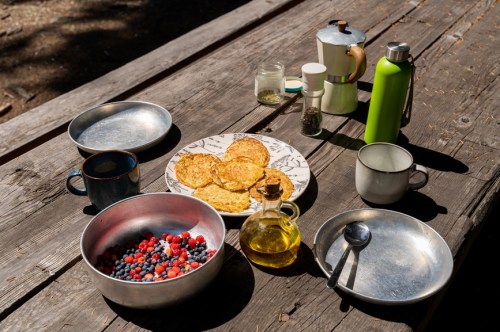If you’re anything like me, you might consider coffee to be the (culinary) love of your life… or perhaps you don’t skip a day without enjoying a cup or two of green tea. Ring true? Luckily we’re in good company, as residents across four of the five Blue Zones also take their caffeine game pretty seriously.
Experts in This Article
Brooklyn–based registered dietitian
Ahead, discover how the caffeine habits of the world’s longest-living people complement their long-term health and well-being.
How can caffeine enhance longevity?
“Caffeine is thought to be inversely correlated with a lower risk of certain chronic diseases—namely, neurological diseases like Alzheimer’s Disease—as well as other conditions like asthma, liver disease, type 2 diabetes, cardiovascular disease, and liver, endometrial, and prostate cancers,” says Maddie Pasquariello, MS, RDN, a dietitian based in Brooklyn.
More specifically, coffee isn’t only a dietary staple in three Blue Zones, but also for an estimated 1 billion people worldwide. (Fun fact: Finland clocks in with the highest consumption of coffee per person… and it’s also the happiest country on earth. Coincidence? I think not.)
Pasquariello continues to say that the potential benefits of caffeine for increasing lifespan are “thought to be especially prevalent among adults who consume a moderate amount of coffee each day.” However, we also shouldn’t (ahem) sleep on green tea, which is deeply ingrained into the daily routines of residents in the Blue Zone of Okinawa, Japan.
Per a massive study of nearly 500,000 participants in the United Kingdom (not home to a Blue Zone, but bear with me), both beverages offer caffeine and chlorogenic acid; the two constituents boast antioxidant and anti-inflammatory properties while also “lowering blood pressure, insulin resistance, and improving endothelial function.” Most notably, researchers found that drinking one cup of coffee or three cups of tea daily was associated with the lowest risk of mortality. Meanwhile, a daily diet that included one or two cups of coffeeand two to four cups of green tea was associated with a 22 percent lower risk of mortality.
A closer look at how the Blue Zones caffeinate
Nicoya Peninsula, Costa Rica: Diluting coffee
As Blue Zones scholar and longevity expert Dan Buettner previously told Well+Good, residents of Nicoya, Costa Rica enjoy more frequent helpings of weaker coffee throughout the day. In other words, they don’t solely rely on it for a quick jolt of energy. So how can this method encourage good health?
“By diluting your coffee, you can stretch out the length of time that it takes all of the caffeine to hit your system. When all of the caffeine hits your system at once, the effects will naturally be more pronounced,” Pasquariello says. “Any anxiety, jitters, racing heart, or digestive upset you might feel from coffee will occur that much faster and can be unpleasant.” That said, Nicoya residents also enjoy their brews after lunch to move digestion along, and later enjoy a small caffeine hit with a late afternoon snack. (Aka, one of the best ways to avoid the uncomfortable side effects of having too much caffeine.)
“By diluting your coffee, you can stretch out the length of time that it takes all of the caffeine to hit your system,” Pasquariello says. “Any anxiety, jitters, racing heart, or digestive upset you might feel from coffee will occur that much faster and can be unpleasant.”
Ikaria, Greece and Sardinia, Italy: Caffeinating with company
Ikarian coffee is lightly roasted and finely ground. It’s also boiled, which extracts a higher amount of beneficial compounds in coffee—and yields a lower amount of caffeine—compared to a standard brew-and-filter method. Meanwhile, Sardinians largely sip on espresso-based beverages. Although their preferred types of coffee vary, residents across both Blue Zones share the habit of caffeinating in the company of others.
“Despite the rising occurrence of eating meals alone, eating and drinking are inherently social concepts in many parts of the world, including the Blue Zones,” Pasquariello says. As it turns out, drinking coffee within a social setting has the potential to amplify the benefits you’d get from either option on its own. “Studies show that those who eat together in groups have higher levels of self-esteem and often possess stronger social support systems. These social support systems can ensure that we have better care systems in place as we age,” she adds.
“Studies show that those who eat together in groups have higher levels of self-esteem and often possess stronger social support systems. These social support systems can ensure that we have better care systems in place as we age.”
Okinawa, Japan: Sipping green tea throughout the day
According to Buettner, “Okinawans nurse green tea all day long,” a habit that undoubtedly factors into their favorable health outcomes. Pasquariello notes that green tea consumption is linked to a lower risk of cardiovascular disease, metabolic syndrome, certain cancers, and other illnesses. “These benefits are thought to be related to its polyphenol content, including flavanols and flavonols,” she explains. “They act as antioxidants in the body, scavenging for free radicals and helping to prevent cellular damage, which can lead to a host of diseases.”
Catechins are one such flavanol with a wide range of benefits for health—including but not limited to bolstering your immune defenses and helping to balance the gut microbiome. Functional medicine expert Mark Hyman, MD, also singled out green tea as the top drink for longevity, citing catechins as “some of the most powerful disease-fighting phytonutrients found in the plant kingdom.”
The takeaway
It’s clear from the Blue Zones examples above that caffeine can definitely factor into a healthy diet for longevity. However, this doesn’t mean that you *need* to reach for the stimulant for the sake of boosting your chances of living a long and healthy life. After all, the Seventh-Day Adventist community in Loma Linda, California, is encouraged “to adopt the most healthful diet possible” (which includes abstaining from caffeine, as it’s technically a drug), yet the city is still a Blue Zone nonetheless.
“The key thing to note with caffeine is that if you’re not already consuming it, if you don’t like the taste, or if it impacts you negatively, there is definitely no need to add it to your diet,” Pasquariello says. “There are some risks to consuming high amounts of caffeine as well, so it’s important to consume it in moderation.” In addition, she says that more research is needed to fully understand caffeine’s mechanisms of action as they relate to disease prevention and longevity.
Lastly, it’s important to remember that there isn’t one magic bullet—caffeine or otherwise—that’ll guarantee a long life. “A balanced diet, regular physical activity, social support systems, and other factors also play a huge role in longevity,” Pasquariello reminds us. So if you love to caffeinate, continue on ahead. Prefer to pass? That’s totally fine, too.
Sign Up for Our Daily Newsletter
Get all the latest in wellness, trends, food, fitness, beauty, and more delivered right to your inbox.
Got it, you've been added to our email list.










